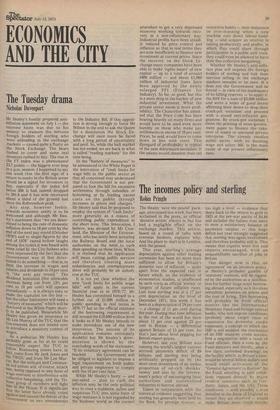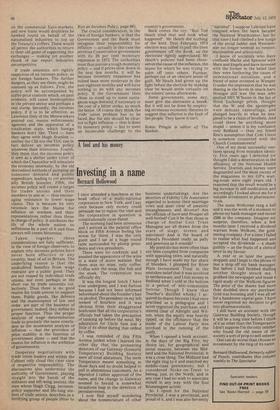The incomes policy and sterling
Robin Pringle
The Healey 'save the pound' package, unwrapped last week, has been acclaimed in the press, as official 'decisive action' always is, but has had a negligible effect on the exchange market. This article, based on a round of talks with overseas bankers, explains why. And the place to start is in London, with the pound.
This year, sterling's average depreciation against other leading currencies has been no more than sufficient to allow for Britain's domestic rate of inflation — quite apart from the expected rate in future which, on the evidence of econometric studies, is unaffected by such trivia as official 'norms' or 'targets' of future inflation rates. Last June sterling was at a 17 per cent depreciation on the level of December 1971; this week it has been at a depreciation of 28 per cent — a change of 11 per cent during the year. During that time inflation in the rest of the world has been about 12 per cent against 25 per cent in Britain — a differential against Britain of 13 per cent. So that's just about level pegging for British export prices.
However, last year Britain was running the world's largest current account payments deficit of $9 billions, and sterling was being artificially propped up by the short-term investment of an undue proportion of oil-rich sheikhs' money and also by the Government's policy of encouraging local authorities and nationalised industries to borrow abroad.
Taken in conjunction with the historical evidence suggesting that sterling has generally been held by the Bank, for prestige reasons, at
too high a level — evidence that dates back to the return to gold in 1925 at the pre-war parity of $4.86 and includes the failure ever since to earn a satisfactory balance of payments surplus — this huge deficit last year strongly suggested that sterling was again overvalued and therefore probably still is. This means that exports were lost and imports encouraged, with an unquantifiable sacrifice of jobs in Britain.
One danger now is that an 'agreement' on an incomes policy, or Healey's probable gambit of 'statutory' controls, will be regarded by the authorities as a justification for further large-scale borrowing abroad, especially as it involves unrealistic promises on prices and the cost of living. This borrowing will probably be from official sources like the International Monetary Fund and foreign central banks, who will impose conditions, (probably about target rates of expansion for domestic credit expansion, a concept to which the IMF is still wedded: the mechanics of an IMF stand-by credit involve first a negotiation with a team of Fund officials, then a vote by the Fund directors and thirdly, after a few days, unlimited drawings on the facility which, in Britain's case, would be several billion dollars and would entail activation of the "General Agreement to Borrow" by the Fund, entailing in turn conditions imposed directly by major creditor countries such as Ger
many, Japan, and the US). These conditions — with possibly a man installed in the Bank of England to
ensure they are observed — would make Britain more credit-worthy on the commercial Euro-markets, and new loans would doubtless be hawked round on behalf of the nationalised industries to top up the Treasury's coffers. These would all permit the authorities to return to their old game of supporting the exchanges — making yet another chunk of our export industries uncompetitive.
If trade unionists are rightly suspicious of an incomes policy, so are foreign bankers. The further dangers, as they see them, might be summed up as follows. First, the policy will be accompanied by stiffer price controls which, on past evidence, will cause bankruptcies in the private sector and perhaps a real slump. Secondly, the incomes policy, if it is to be effective, as Lawrence Daly of the Mineworkers pointed out, means enforcement agencies and the apparatus of a totalitarian state, which foreign bankers don't like. Third — here they agree with Hugh Scanlon — neither the CBI nor the TUC can in fact deliver an incomes policy whatever their intentions. Fourth, they think that the incomes policy is seen as a shelter under cover of which the Chancellor will stimulate the economy internally, by the old discredited methods of pumping up consumer demand and public expenditure, leading to yet another silly British boomlet. Fifth, the incomes policy will create a target for trades unions and their members to aim at — thus encouraging resistance to lower wage claims. This is because its very rationale lays the blame for inflation on workers and their representatives rather than those in charge of policy. It attributes the ills of the whole nation to selfishness by a part of it and thus always will create bitterness.
Taken together, these
considerations are fully sufficient, in the view of foreign observers, to explain why incomes policies have never been effective in any country, least of all in Britain. The underlying reason is that the undoubted benefits from wage restraint are a public good. They are not reaped by individual trade unions, nor even perhaps in the short run by trade unionists collectively. Thus there is no good reason for trade unions to support them. Public goods, like defence and the maintenance of law and order, are part of the business of government. Indeed, they define its proper function. Thus the proper analysis of wage determination leads to precisely the same conclusion as the monetarist analysis of inflation — that the provision of price stability is the function of government alone — and that the reason for inflation is the ambition of governments.
Desperate negotiations with trade union leaders and within the Cabinet only cloud this clear view of respective responsibility. The discussions also undermine the authority of Government, playing straight into the hands of the militants and left-wing zealots, the men whom Hugh Clegg, incomespolicy supporter and life-long student of trade unions, describes as a terrifying group of people (How to Run an Incomes Policy, page 86).
The crucial consideration, in the view of foreign bankers, is that the Government and the Bank must recognise their responsibility for inflation — actually in this case the previous Conservative government with its 28 per cent monetary expansion in 1973. The authorities must thus pursue a tough monetary policy — and if prices slow down in the next few months, it will be because monetary expansion has indeed been more moderate in the past eighteen months and will have nothing to do with any incomes policy. If the Government then chose to stand up to some outrageous wage demand, if necessary at the cost of a bitter strike, so much the better. Of course they think the trade union problem has to be faced.. But the aim should be clear: not to fight inflation — that is done by monetary policy — but to meet an intolerable challenge to the
country's government.
Back comes the cry: "But Ted Heath tried that and look what happened". Mr Heath did nothing of the kind. That February 1974 election was called to pull the then government off the hook, as the electorate rightly appreciated. Mr Heath's policies had been themselves the cause of the inflation, the blame for which he was trying to palm off onto others. Further, perhaps out of an obscure sense of guilt, Mr Heath had given up the fight before the election by making clear he would settle virtually on the miners' terms afterwards.
Some government, some day, must give the electorate a break. But it will not be done by employing erroneous economic theories to suggest that inflation is the fault of the people. They know it isn't.
Robin Pringle is editor of The Banker.



































 Previous page
Previous page